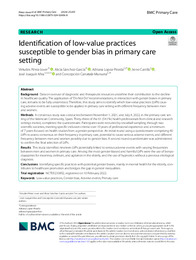Por favor, use este identificador para citar o enlazar este ítem:
https://hdl.handle.net/11000/34914Registro completo de metadatos
| Campo DC | Valor | Lengua/Idioma |
|---|---|---|
| dc.contributor.author | Pérez-Jover, Virtudes | - |
| dc.contributor.author | Sánchez-García, Alicia | - |
| dc.contributor.author | Lopez-Pineda, Adriana | - |
| dc.contributor.author | Carrillo, Irene | - |
| dc.contributor.author | Mira, José Joaquín | - |
| dc.contributor.author | Carratalá‐Munuera, Concepción | - |
| dc.contributor.other | Departamentos de la UMH::Psicología de la Salud | es_ES |
| dc.date.accessioned | 2025-01-18T09:59:01Z | - |
| dc.date.available | 2025-01-18T09:59:01Z | - |
| dc.date.created | 2024 | - |
| dc.identifier.citation | BMC Primary Care (2024) 25:205 | es_ES |
| dc.identifier.issn | 2731-4553 | - |
| dc.identifier.uri | https://hdl.handle.net/11000/34914 | - |
| dc.description.abstract | Background Data on overuse of diagnostic and therapeutic resources underline their contribution to the decline in healthcare quality. The application of“Do Not Do” recommendations, in interaction with gender biases in primary care, remains to be fully understood. Therefore, this study aims to identify which low-value practices (LVPs) caus ing adverse events are susceptible to be applied in primary care setting with diferent frequency between men and women. Methods A consensus study was conducted between November 1, 2021, and July 4, 2022, in the primary care set‐ ting of the Valencian Community, Spain. Thirty-three of the 61 (54.1%) health professionals from clinical and research settings invited, completed the questionnaire. Participants were recruited by snowball sampling through two scientifc societies, meeting specifc inclusion criteria: over 10 years of professional experience and a minimum of 7 years focused on health studies from a gender perspective. An initial round using a questionnaire comprising 40 LVPs to assess consensus on their frequency in primary care, potential to cause serious adverse events, and diferent frequency between men and women possibly due to gender bias. A second round-questionnaire was administered to confrm the fnal selection of LVPs. Results This study identifed nineteen LVPs potentially linked to serious adverse events with varying frequencies between men and women in primary care. Among the most gender-biased and harmful LVPs were the use of benzo diazepines for insomnia, delirium, and agitation in the elderly, and the use of hypnotics without a previous etiological diagnosis. Conclusions Identifying specifc practices with potential gender biases, mainly in mental health for the elderly, con‐tributes to healthcare promotion and bridges the gap in gender inequalities. | es_ES |
| dc.format | application/pdf | es_ES |
| dc.format.extent | 8 | es_ES |
| dc.language.iso | eng | es_ES |
| dc.publisher | BioMed Central | es_ES |
| dc.rights | info:eu-repo/semantics/openAccess | es_ES |
| dc.rights | Attribution-NonCommercial-NoDerivatives 4.0 Internacional | * |
| dc.rights.uri | http://creativecommons.org/licenses/by-nc-nd/4.0/ | * |
| dc.subject | Low-value practices | es_ES |
| dc.subject | Gender bias | es_ES |
| dc.subject | Adverse events | es_ES |
| dc.subject | Primary care | es_ES |
| dc.subject.other | CDU::1 - Filosofía y psicología::159.9 - Psicología | es_ES |
| dc.title | Identifcation of low‐value practices susceptible to gender bias in primary care setting | es_ES |
| dc.type | info:eu-repo/semantics/article | es_ES |
| dc.relation.publisherversion | https://doi.org/10.1186/s12875-024-02456-8 | es_ES |

Ver/Abrir:
8.s12875-024-02456-8 (1).pdf
939,99 kB
Adobe PDF
Compartir:
 La licencia se describe como: Atribución-NonComercial-NoDerivada 4.0 Internacional.
La licencia se describe como: Atribución-NonComercial-NoDerivada 4.0 Internacional.
.png)